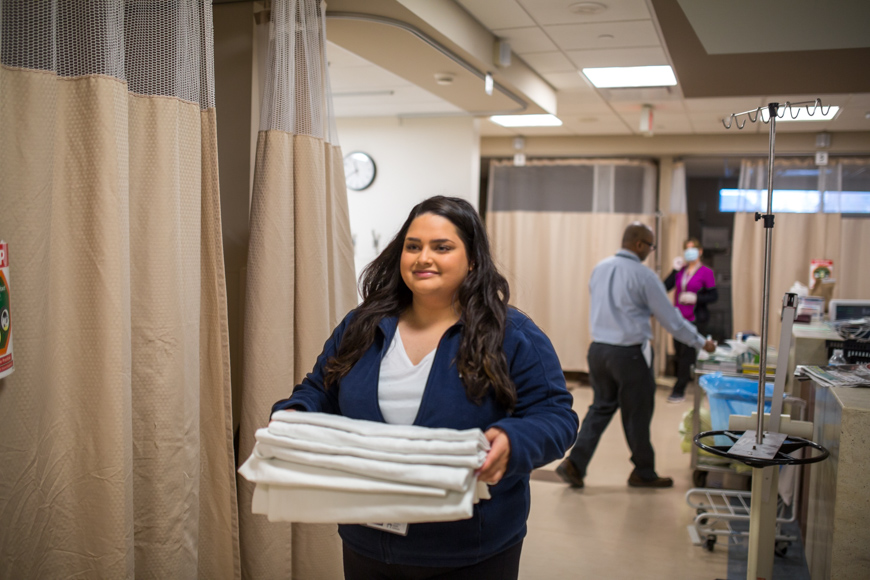
A simple gesture goes a long way
Every Friday afternoon, Jocelyn Kuber volunteers in the Emergency Department (ED) at Juravinski Hospital and Cancer Centre (JHCC). Jocelyn is a university student, and aspires to go to medical school, so she wanted to gain experience in a hospital. When she approached our Volunteer Resources team in spring of 2017 and learned of the ED volunteer program, she jumped at the chance.
“I wanted to experience the fast paced environment of the ED to confirm it really was the right career path for me, and it quickly did!” says Jocelyn. “While this volunteer experience is of course valuable to have when applying to medical school, that’s not why I’m continuing to do it.”
The ED volunteer program follows the Hospital Elder Life Program (HELP) model, a delirium prevention approach. Delirium is a state of serious confusion and reduced awareness that can be brought on by illness. It’s common among older adults in the hospital environment. Considering two thirds of the JHCC’s ED admissions are older adults, the team wanted to equip volunteers to support patients at risk of delirium.
“It’s amazing to think that something as simple as chatting with a patient can make such a big impact.”
The volunteer program focuses on HELP based interventions such as having a calming conversation, orienting the patient to day, time and location, or prompting the patient to use sensory aids like glasses, or hearing aids. Volunteers can also provide therapeutic activities like reading materials or puzzle games, help patients with mobility or aid them in routine activities like eating and drinking or adjusting the settings on their bed.
Jocelyn finds the work so rewarding, “It’s amazing to think that something as simple as chatting with a patient can make such a big impact. I feel so lucky that even though I’ve got a few years before being a doctor, I can still help people in the hospital.”
As with the HELP program, the ED volunteer program requires more training than a typical volunteer position to ensure proper understanding of delirium and the interventions. Once the knowledge based training is complete, shadowing an experienced volunteer is essential to begin working with patients and to learn the inner workings of the ED.
By having volunteers dedicated to HELP interventions it allows staff to focus on existing medical issues.
Although this role requires dedication, the unique collaboration between the volunteers and staff is what makes the program such a great opportunity for students interested in the healthcare field. By having volunteers dedicated to HELP interventions it allows staff to focus on existing medical issues.
“I check in with the nurses to see which patients they feel could use some assistance,” says Jocelyn. “There’s faster turnover than in a hospital ward so it’s really important to keep an open dialogue with the staff to ensure I can help when needed.”
The program has been very successful. Patients and family members have responded positively, staff appreciate the help in meeting the needs of our older patients, and volunteers find the work rewarding. It’s recently expanded to the ED at the Hamilton General Hospital in hopes of seeing similar successes.
